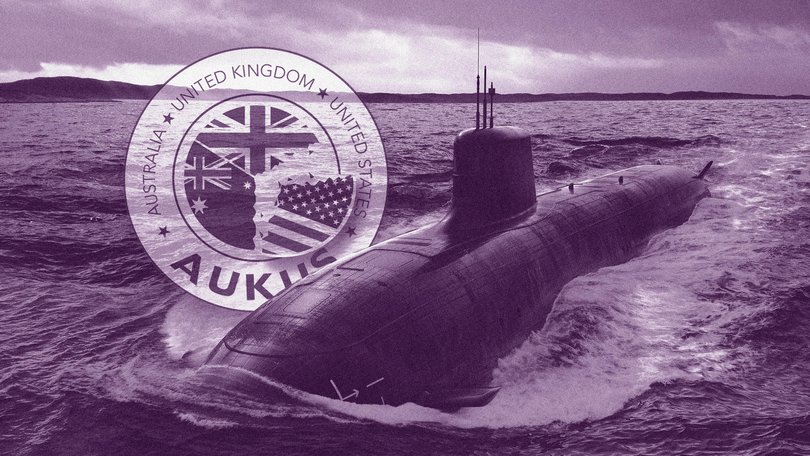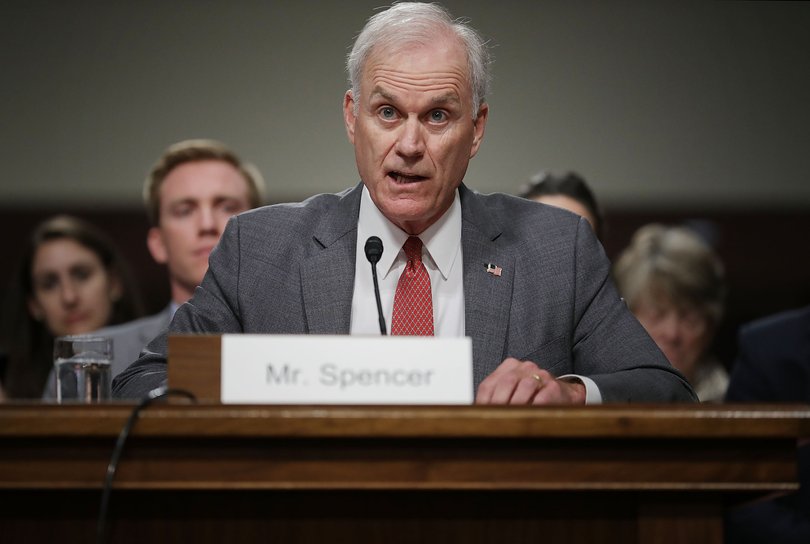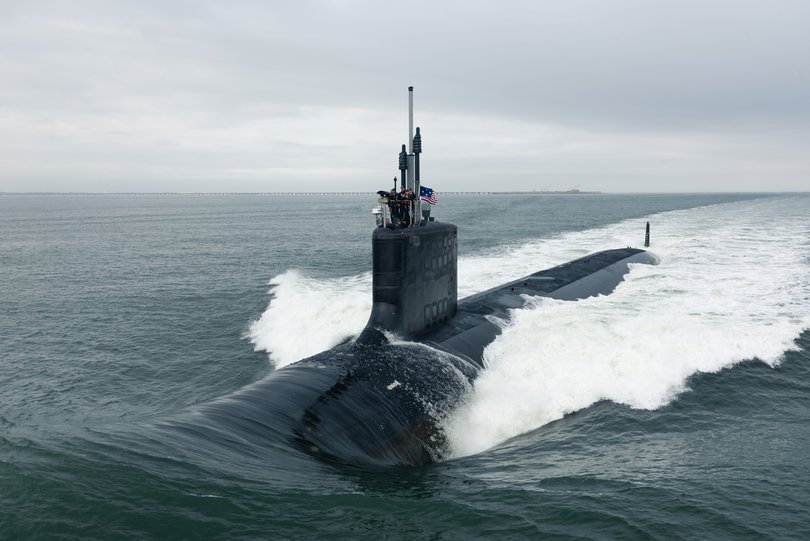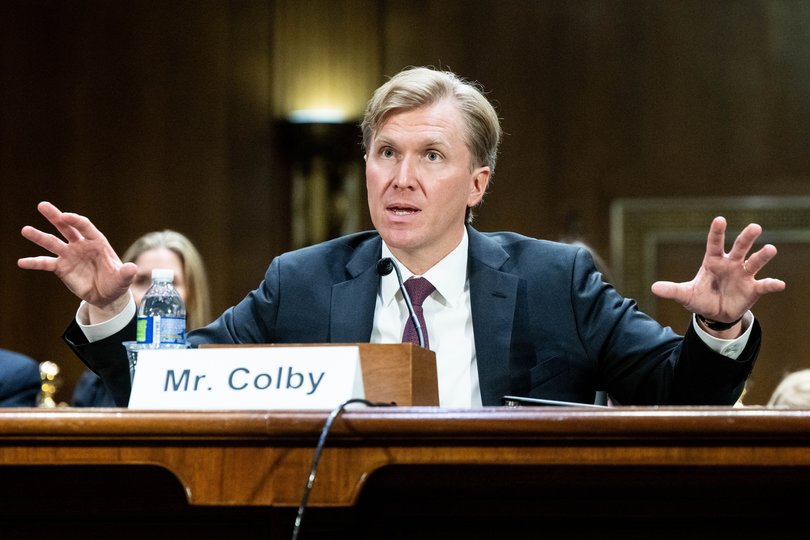LATIKA M BOURKE: Former US Navy boss Richard Spencer says Australia needs to ‘step up’ on AUKUS amid review
LATIKA M BOURKE: Richard Spencer, the former Secretary of the US Navy, says slow progress by Labor to advance AUKUS is partly to blame for the Pentagon review, warning Australia must ‘start moving’.

The former Secretary of the US Navy, Richard Spencer, says the slow progress Labor has made on advancing AUKUS is partly behind the Trump Administration’s snap review into whether to proceed with the submarine sale to Australia.
However, he said the dominant concern was the production rates of submarines in the US amid growing tensions with China, increasing the prospect of a conflict in the Indo-Pacific.
Mr Spencer is also the chairman of shipbuilder Austal and adviser to Bondi Partners, the firm established by former Treasurer and Ambassador to the US Joe Hockey, which works heavily on AUKUS.
Sign up to The Nightly's newsletters.
Get the first look at the digital newspaper, curated daily stories and breaking headlines delivered to your inbox.
By continuing you agree to our Terms and Privacy Policy.Speaking exclusively to the Latika Takes podcast during a visit to London to meet the UK’s AUKUS envoy Stephen Lovegrove and key parliamentarians working on AUKUS, Mr Spencer said Australia needed to “step up a little more” on its defence budget.

The Trump Administration has asked Australia and other Indo-Pacific allies, including Japan, to raise their defence spending to the new NATO standard of 3.5 per cent.
Australia’s Prime Minister Anthony Albanese is refusing to acquiesce and says the current spend of around 2 per cent of GDP is enough.
Mr Spencer, who served as US Secretary of the Navy between 2017 and 2019 and focused on the Indo-Pacific, said while not even the US was funding its military adequately, their requests for others to do more were legitimate.
“Yes, it is valid and I approach that answer in the fact that, to be 100 per cent across the board for all missions, they do not have the appropriate funding right now,” he said.
“I would also say to do every single mission, I don’t know if the United States is funded appropriately, to be very frank, to do a hundred per cent of absolutely everything.
“A better approach would be, can you do the mission you’re tasked to do?’ That’s the most important thing.
“That being said, Australia should step up a little more on the budget if they’re serious about performing, in the alliance that we have over in the Indo-Pacific and completing their mission.”

He said the prospect of a conflict between China and the US being deliberately started was low, but that there was a higher possibility one could begin by accident or as a result of the Chinese military’s dangerous conduct, such as when they dropped flares in front of Canadian and Australian pilots mid-air.
Asked whether HMAS Stirling, the naval base in Western Australia where US submarines will dock and operate beginning in 2027, was fit for purpose, Mr Spencer said: “No, no it’s not.”
“And I think a lot of decisions have to be made in Australia,” he said.
The Government has allocated funds towards consolidating the nearby Henderson shipbuilding and maintenance yard into a giant naval precinct that will welcome and maintain nuclear-powered submarines.
But Mr Spencer said so far, it was just talk.
”They’ve talked about it, the Australians have talked about it,” he said.
“I’m sure in their hearts there’s a plan, but you know what? That should be started yesterday.
“We need to start moving dirt, putting the infrastructure in, because 2027 is going to be here within the blink of an eye and 2030 will follow very quickly.
Asked if these were the perceptions driving the Trump Administration’s review into AUKUS, Mr Spencer was emphatic.
“Yes, I do, yes,” he said.
“I think the hearts are there.
“We need to see action.
“I think those who are driving AUKUS in Australia truly believe it, but there has to be more action.
“It has to go from politics to military to construction; it can’t just continually be a policy; it has to be an output metric.”
The Pentagon’s chief AUKUS-sceptic and Mr Trump appointee, Elbridge Colby, is due to complete within days his “America First” inquiry into whether the United States should proceed with the deal to sell Australia between three and five nuclear-powered submarines beginning in the 2030s.
US Secretary of Defence Pete Hegseth has said that the review is to see whether AUKUS fits into US President Donald Trump’s priorities. Mr Trump has never said himself whether he backs or opposes AUKUS although Mr Hegseth previously said the President was a supporter.
Mr Spencer, who served as US Secretary of the Navy between 2017 and 2019, worked with Mr Colby when they both served in the first Trump Administration and said he backed his “intelligence and acumen” to oversee the review.
“This was laid down in the Biden Administration and I think it’s some of the best statecraft done in the last 70 years,” he said.
“I think AUKUS is a beautiful thing in many fronts
“But now it’s the Trump Administration. They have the right to review it, and I think that’s actually healthy.
“I do not think this is a scrap exercise.”
Last year, Mr Colby told The Nightly that he would not have signed up to AUKUS if it were put to him originally and questioned giving Australia the “crown jewels” of nuclear technology.

He has since said he supports the project, but his surprise review, combined with the Trump Administration’s direct calls for Australia to raise its defence spending from 2 per cent to 3 per cent of GDP, has sparked concerns he could scrap the deal or demand more money from Australia.
But Mr Spencer said the dominant concern preoccupying Mr Colby was whether US submarine production could reach the required production rate of just over two boats per year, to honour the commitment to Australia.
”The biggest block in my readings from Bridge is the production,” he said.
“When I was Secretary, we were at about two a year, we slumped down in Covid to 1.3, 1.2, we’re at 1.6 now.”
Asked how soon the US could restore its production rate to two, Mr Spencer was bullish.
“I’ll go out on a limb, I think we can do it sooner rather than later,” he said.
“If we can see module production increasing, I think we can get back to two within 12 months.”
He said this timeframe would make AUKUS viable.

